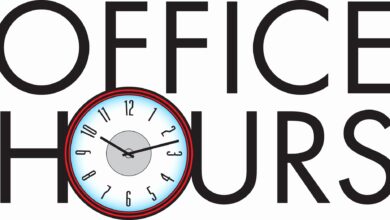Muller Quaker Dairy yogurt maker opens
by Kristina Gabalski
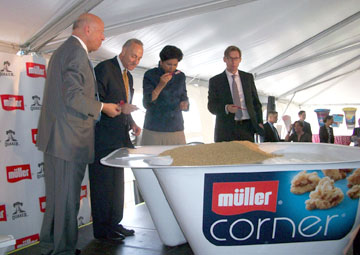 Theo Muller, owner of the Muller Group, U.S. Senator Charles Schumer, Indra Nooyi, Chairman and CEO, PepsiCo and Stefan Muller, member of the board, Theo Muller Group, sample yogurt from a gigantic Muller Corner during the opening celebration of the Muller Quaker Dairy in Batavia June 3.“It’s a match made in dairy heaven, combining one of the largest milk producing regions in the country with one of the fastest growing milk based products in the world,” U.S. Senator Charles Schumer said during a celebration held Monday, June 3, to mark the opening of the Muller Quaker Dairy yogurt manufacturing facility in Batavia.
Theo Muller, owner of the Muller Group, U.S. Senator Charles Schumer, Indra Nooyi, Chairman and CEO, PepsiCo and Stefan Muller, member of the board, Theo Muller Group, sample yogurt from a gigantic Muller Corner during the opening celebration of the Muller Quaker Dairy in Batavia June 3.“It’s a match made in dairy heaven, combining one of the largest milk producing regions in the country with one of the fastest growing milk based products in the world,” U.S. Senator Charles Schumer said during a celebration held Monday, June 3, to mark the opening of the Muller Quaker Dairy yogurt manufacturing facility in Batavia.
Senator Schumer called the opening celebration a “great day for the whole region, New York State and our country.”
The facility is a joint venture between PepsiCo and the Theo Müller Group and is the second yogurt plant to open in Batavia in the past eight months. Alpina Foods of Bogota, Columbia, opened their facility last October. Both yogurt plants are located in the Genesee Valley Agri-Business Park just east of the City of Batavia.
“All fluid milk (used by the facility) will come from local Upstate Niagara Co-Op dairy farmers,” Schumer said. He noted the bottom line of the plant opening means, “… jobs, jobs and more jobs.”
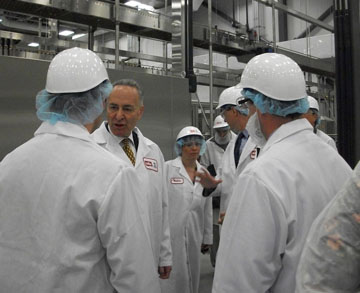 Senator Charles Schumer gets a tour of the secondary packaging area of the new Muller Quaker Dairy yogurt facility in Batavia on Monday, June 3. Schumer was on hand for the opening celebration of the plant, one of the largest yogurt making facilities in the country. The Muller Quaker facility will employ slightly more than 180 people and Senator Schumer said more jobs will also be created in the local dairy farming industry. “It’s an amazing shot in the arm for the economy here in Western New York – the Rochester and Buffalo areas,” Schumer said.
Senator Charles Schumer gets a tour of the secondary packaging area of the new Muller Quaker Dairy yogurt facility in Batavia on Monday, June 3. Schumer was on hand for the opening celebration of the plant, one of the largest yogurt making facilities in the country. The Muller Quaker facility will employ slightly more than 180 people and Senator Schumer said more jobs will also be created in the local dairy farming industry. “It’s an amazing shot in the arm for the economy here in Western New York – the Rochester and Buffalo areas,” Schumer said.
He noted that when the Agri-Business Park has full capacity, 1,200 more people could be employed there. He invited other food processors to “come here to Genesee County and see what a great (agri-business) park we have.”
Currently, three production lines are running at Muller Quaker, which can produce more than 120,000 cups of yogurt per hour. Eventually, Muller Quaker hopes to have eight lines running.
The facility in Batavia will produce Müller® FrutUp™, Müller® Corner®, and Muller® Greek Corner® yogurts and will allow Muller Quaker the opportunity to store and distribute to retailers nationwide from the plant in Batavia.
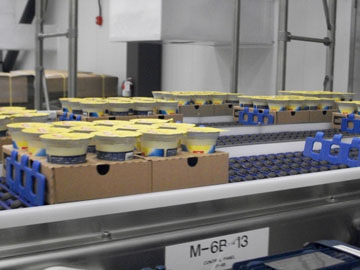 Containers of yogurt roll off the production line at the new Muller Quaker Dairy in Batavia. PepsiCo CEO Indra Nooyi said Danny Wegman had suggested to her that PepsiCo become involved in yogurt production – as long as the plant was located in Western New York.
Containers of yogurt roll off the production line at the new Muller Quaker Dairy in Batavia. PepsiCo CEO Indra Nooyi said Danny Wegman had suggested to her that PepsiCo become involved in yogurt production – as long as the plant was located in Western New York.
Nooyi took Wegman’s advice and said she has “delivered on the promise” she made.
Danny Wegman told the Suburban News and Hamlin-Clarkson Herald during a tour of the facility, that he found the more than 350,000 square feet, $200 million plant “amazing.”
The Batavia plant is one of the largest in the country for yogurt production. It is the first manufacturing facility for Muller Quaker and is the world’s largest LEED (Leadership in Energy and Environmental Design) Certified dairy facility, Nooyi said.
“We’re going to need a lot of milk,” she told Senator Schumer.
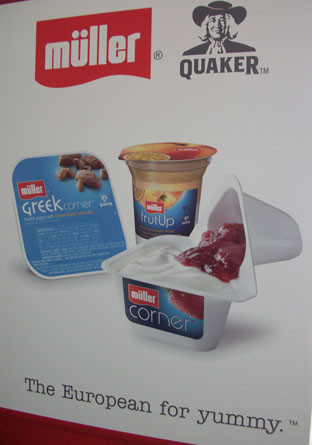 Stefan Müller, board member of the Theo Müller Group, said the opening of the Batavia facility and his company’s entrance into the U.S. market is “the turning of a page in the book of (his) family history. We’re here to stay, we’re here to win,” he said.
Stefan Müller, board member of the Theo Müller Group, said the opening of the Batavia facility and his company’s entrance into the U.S. market is “the turning of a page in the book of (his) family history. We’re here to stay, we’re here to win,” he said.
The Theo Müller Group has become Germany’s largest privately held dairy business and one of Europe’s most well known yogurt producers.
Muller Quaker Dairy CEO Sam Lteif said Müller is a brand with a “rich heritage.” He said production at the Batavia plant will “ramp up” this summer with the production of new summer flavors like mango, orange and passion fruit/mango yogurts.
Muller Quaker officials said Americans consume less than half the amount of yogurt that Western Europeans consume (per capita), meaning there is tremendous growth potential in the U.S. market. Since 2007, the U.S. yogurt market has grown from $4.2 billion to $6.2 billion in 2012. By 2017, it’s expected to top $8.5 billion.




